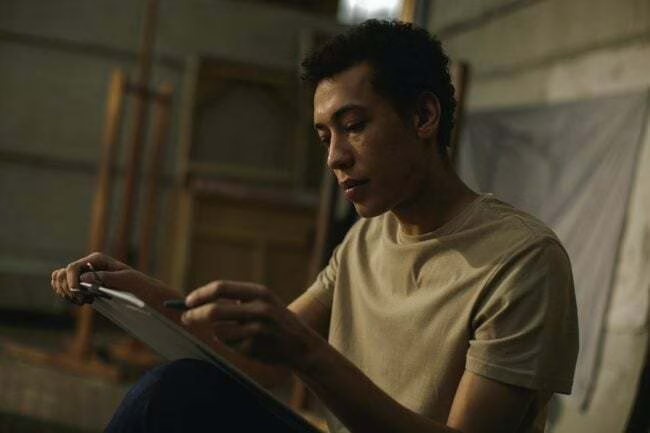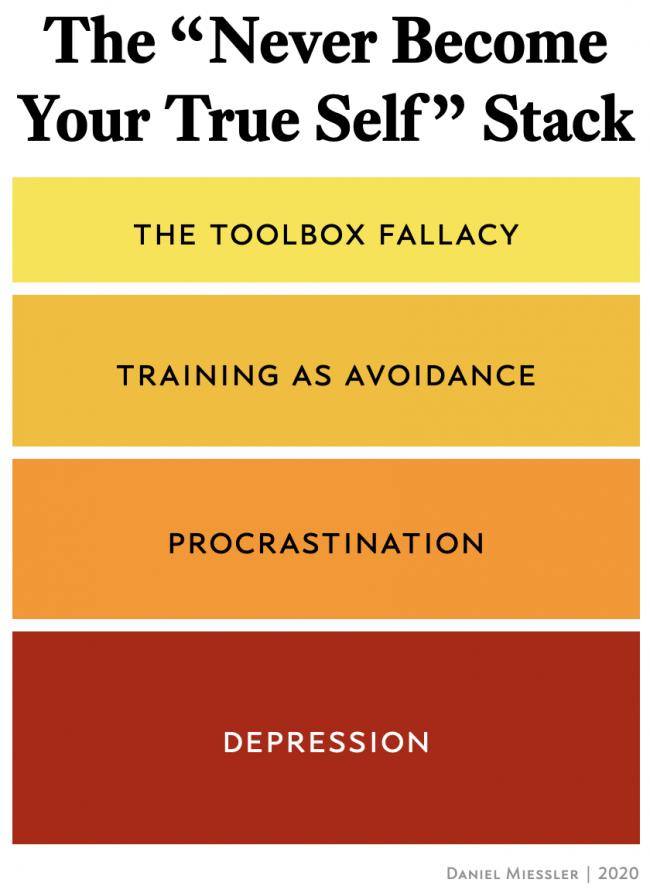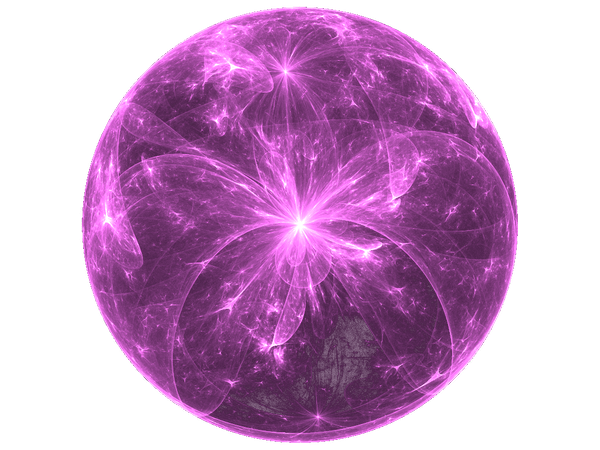Searching for the Ultimate Obstacle to Creativity

I think a lot about how to be a better creator, which usually means trying to produce more content, produce better content, or improving its structure and presentation.
As creators—especially new ones—one of the main questions we have is:
How is so-and-so able to produce so much great content? How do they do it? What’s their secret? And why can’t I force myself to just do it?
And for analytical types (which many creators are), we then proceed to break down their methodologies, kind of like Tim Ferris does on his podcast >.
I think too many would-be creators look at these as reasons they’ll never be as good.
They get up early
They have Nikon equipment
They went to an Ivy League school
Their parents had money
They’re good looking
They’re funny
They don’t have kids and work all day long
They happened to know a great mentor
Etc., etc.
Many would-be creators get stuck in this phase.
First, this kind of "studying the greats" can create and aggravate Imposter Syndrome > when you see all these Olympic efforts from the best in the world. But even worse, it often sets people into 1,000 directions of things they need to buy or become before they can create.
Oh, I need a Canon EOS-1D X Mark III camera before I get started…because that’s what Tarah shoots with…
Then, when life gets in the way, or you have a few setbacks, we realize we aren’t actually creating at all. But all those people continue to. And people keep asking us about what we’ve done, which is nothing. This can discourage us, and combined with other things can exacerbate depression.
Procrastination may be an unhappy mind dropping flares to protect you from the trauma of previous failure.
There’s a rising model > of procrastination puts trauma at its base.
And finally, once we’re depressed, the very act of thinking about being productive, or creative, touches on a raw nerve of shame and guilt. And our mind’s self-defense reaction kicks in with an arsenal of distractions.
Hey! You really need to take out the garbage! And finish that last two episodes of that one Netflix series from 2017. Oh, and reorganize your refrigerator…

Your brain trying to distract you when you’re in a bad state and there’s work to be done
This flow I described above is extremely common for creators, and I just realized it includes three distinct components that we should label and confront.
Training as Avoidance
The Toolbox Fallacy
Procrastination
Training as Avoidance is a label for the problem described brilliantly by the essay, Do The Real Thing >, by Scott Young. He talks about how so many people use their intellects to trick themselves into believing that studying a craft for days, weeks, months—or even years—will somehow get them there.
Consider one person who wrote to me saying she turned down a job working in French. She didn’t feel her French was good enough yet. So instead, she planned to listen to podcasts at home every day until she was ready. You know what would have helped her get good at French? Working at the job in French.
Scott Young, Do The Real Thing >
Scott Young, Do The Real Thing >His simple point is that—no—it’s not the studying that does it. It’s the doing that does it.
The Toolbox Fallacy is a great essay > by Ian Martin that makes a similar but different point, i.e., that it’s quite easy to convince ourselves that we’re waiting for a tool or a life condition before we can get started pursuing our dreams.
The hard truth is that the lack of these things wasn’t actually what was wrong. Having a hammer is not what makes you a carpenter. USING a hammer is what does. A writer writes, be it with laptop, pen, crayon, or haiku carved in the sand with a branch.
Ian Martin, The Toolbox Fallacy >
Ian Martin, The Toolbox Fallacy >The summary here is that tools don’t make creators, creating does. And that rhymes perfectly with using training as avoidance, as seen above.
And finally, we arrive at Procrastination. Procrastination is like colds and flus; it causes serious harm to productivity around the world, but doesn’t get much attention because it’s so common.
You might be thinking:
Right, sure, procrastination. Obviously putting things off can be a cause of not getting things done that you want to do. No duh.
And that’s fair. But I believe procrastination is tied to Training as Avoidance and The Toolbox Fallacy much more deeply and significantly.
Not all training or study is procrastination, of course.
First, as you might have observed, the first two are types of procrastination. They’re both mechanisms that smart people use to convince themselves that there’s a good reason for not being productive. That’s the trap—tricking yourself into thinking you’re being productive when you’re not. And smart people are great at self-deception.
But I think what might unite them even more is a common root cause.

A potential underlying cause of "failure to become"
There’s a theory of procrastination > that’s gaining popularity right now that says it’s more like a self-defense mechanism vs. trauma than a harmless distraction activity.
This really resonates with me.
This is just my crude explanation of my understanding of it. I suggest more reading of experts on the topic.
In this model, the bottom of the stack is actually trauma and/or depression, and procrastination is a mechanism by which the mind protects us from re-experiencing that trauma.
So if we think we’re losers at any given moment, or we think other people think we are, we then avoid activities in which we might fail and confirm that belief.
Someone really bad off might not try or do anything, and just freeze into depression. But someone who’s more functional might go through all the productivity motions of studying, and training, and learning, and practicing—but do so as an elaborate mechanism for not actually trying.
I probably got this idea partly because I recently read this book called Complex PTSD >, recommended as a way of better understanding people going through tough times. But the reason I thought of this connection to creators and procrastination is that the book talks about how trauma—of various degrees—really sits at the bottom of so much of our behavior.
Before reading the book I thought trauma was kind of binary—either it’s extreme and violent, or it’s not trauma. But it made me think of it as more of a spectrum, with lots of different causes and types, from simply not getting enough love from the right people to actual physical abuse.
Anyway, that’s all interesting, and I encourage you to read more if it resonates with you. But it’s admittedly pretty heavy for a post about creators and procrastination. Sorry about that.

The unifying thread to me is that rejection, Imposter Syndrome, not feeling enough love from friends and loved ones, and just general unhappiness and depression could all be a single ball of plasma that powers our inability to create.
And we get confused by the forms this takes, whether it’s shutting down, or studying too much, or waiting for that special thing you need before you can start.
And that brings us to solutions.
What I liked so much about the CPTSD book was that it reminded me to think about root causes. I do this naturally, just as most people reading this, but I mostly do it for work things. For problem-solving.
Well, if you want to be a creator, then not being able to create is a problem.
And so, for practical takeaways, I suggest a few things from this.
If you’re having trouble creating, think deeply about the reason.
Ask yourself if you’re seeing any of the behaviors of Training as Avoidance or engaging in the Toolbox Fallacy.
If you are, consider framing them as forms of procrastination.
And then—as the ultimate takeaway here—realize that everyone has been prescribing the wrong medicine for the inability to create.
Don’t try to fix your creator problems with even more study, or even better tools. Instead, look yourself right in the face, and tell yourself the following.
You are wonderful. You are creative. You are capable. You are loved. I am thankful you exist. And you are going to be awesome.
That message hits the bottom of this creativity-disruption stack, and I think it can unravel a lot of the knots that manifest as the symptoms we’ve talked about.
I know that you can be a great creator. I believe in you. And you should too.
Go do it.
Notes
I am not a clinical psychologist and/but I know that depression is an extremely complex topic that’s not even fully understood or agreed upon by the actual experts. The one thing I am not doing here is implying that something in this equation makes your current state your fault. Quite the opposite. Given my belief in free will, I don’t even believe that’s a thing. But the point here is to identify and label specific internal obstacles to people becoming their ideal selves. And if a profound unhappiness sits at the base of that, then that’s a situation we must address. Maybe that’s straightforward, maybe that’s a lifetime of therapy, or maybe it’s all those things combined with medicine. I don’t know, and it’s different for everyone based on their situation. All I’m proposing is that there could be a unifying cause to the entire stack of self-actualization denial, and that understanding that stack could help us overcome it.
I do find it interestingly paradoxical that depression and trauma are often also associated with extreme creativity, and there are countless examples of this to the point of anecdote becoming data. I wonder if this tradeoff has something to do with creation from trauma vs. creation from a healthy place, and ideally being able to get to the latter. In other words, if someone is a classical troubled artist, then creation can help them cope. But that doesn’t mean one should embrace or cherish or encourage trauma as the only mechanism for creativity. Think we should still strive for a state where we can be just as creative from a place of peace.
My final admonition to tell oneself that you are creative and loved and that you will be awesome is an interesting thing on its own. I subscribe to a concept I call General Absurdism, which is the perverse disconnect between human experience and underlying physical reality. For any given person, they don’t know how creative they are, or could be, given enough grit and a bit of luck. So all one can really do is believe. In oneself, and in others. That’s the irony of creativity. It comes from somewhere not in our control. Inside. Outside. Doesn’t matter. The point is that it might as well be from God, or another dimension. You can be extremely religious or not believe in a single supernatural thing in the world (like me), and still harness the power of the mysterious, the unknown, the creative, and ultimately of love. Those things are unbounded. Nobody knows who has the potential to change the world. You don’t know, and neither do I. But what I can tell you is that you will never find out if you don’t try. So lean in. All the way. It’s the only path.